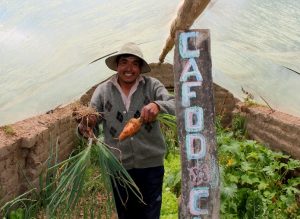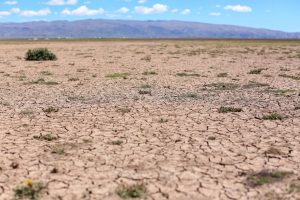This article is by Nikki Evans, CAFOD’s Programme Officer for Bolivia. As she lives in Yorkshire she is regularly to be seen around the Leeds CAFOD Volunteer Centre. This article serves as an introduction to the lecture she will be giving at Leeds Trinity University on 4th May – see the end of the article for more details.
In 2016, Bolivia experienced its worst drought for over 25 years. Water rationing was imposed in the capital, La Paz in November and the reservoirs dried up as an unprecedented crisis unfolded. The rural regions of Bolivia had been suffering for many months due to the low levels of rainfall and over half of the municipalities in the country declared a state of emergency.
The Aymara and Quechua indigenous farming communities living on the Altiplano plain, high in the Andes mountains, were hit hard by the drought. Unable to plant sufficient crops to survive the year, many families have been forced to leave their land to seek temporary employment in the cities. In May, the families that have stayed on their land will harvest their crops in the hope that they have been able to produce enough to survive. Prices of food are expected to rise which will hit hardest those families that are already suffering the effects of last year’s drought.
Farming in harmony with nature and the environment is a central pillar of community life for indigenous farming families. These Andean indigenous communities still organise their political, economic and social systems according to pre-colonial traditions. Community leaders are appointed by rotation with each family obliged to take responsibility for roles within the community and decisions are made by consensus. Land is managed communally and people care for Mother Earth (Pacha Mama) in gratitude for the gifts she gives.
Central to the Andean view of the world is the idea of “vivir bien” which can be roughly translated as “living well”. For many families and communities, vivir bien means living simply in harmony and nature but each person you speak to will have their own idea of what it means for them. One farmer told me “For me, vivir bien means that you have everything you need. You’re able to grow food and you’re able to eat well”. Another said “Before we hardly had any money. We didn’t really grow very much. We didn’t eat very well. I didn’t dress very well. We didn’t have any proper shoes. Now we’ve got much more. We eat well and we’re producing food. For me, that’s vivir bien.”
Respecting communities and each family’s understanding of vivir bien underpins the work of the local Bolivian organisations  supported by CAFOD. These organisations are providing essential support to communities in helping communities respond to the effects of the drought and the challenges of farming in such a tough environment. The work being done to support these families responds directly to their vision of vivir bien. For many families, this may be this may be about having access to water to irrigate their plants, for others it might technical training to help to help them grow more crops or learn how to make bread and cheese.
supported by CAFOD. These organisations are providing essential support to communities in helping communities respond to the effects of the drought and the challenges of farming in such a tough environment. The work being done to support these families responds directly to their vision of vivir bien. For many families, this may be this may be about having access to water to irrigate their plants, for others it might technical training to help to help them grow more crops or learn how to make bread and cheese.
For Don Ismael (right), vivir bien meant having his own greenhouse that allows him to grow vegetables all year round.

